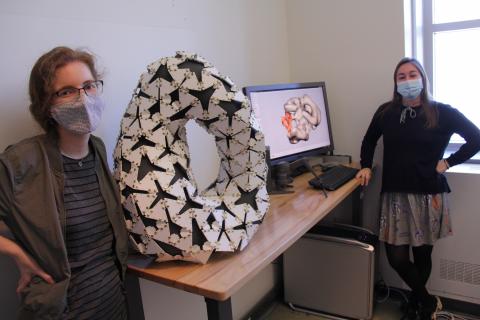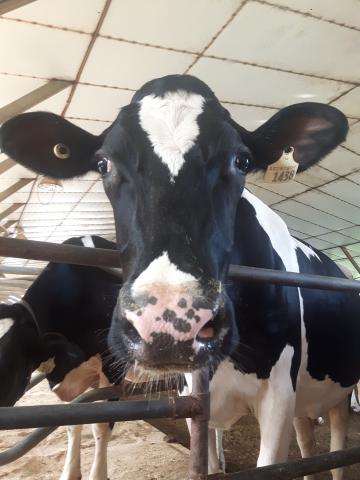- About the Office of Research
- Welcome Message
- Meet the Vice-President (Research)
- Strategic Research Plan
- Mission Statement
- Services and Divisions
- Discover our Research
- Research Chairs
- Facts and Figures
- Centres, Institutes, and Groups
- International Research
- Find a Researcher
- For Researchers
- Safeguarding Research
- Commercialization Policy and Framework
- Equity, Diversity, and Inclusion in Research
- Research Alerts
- Funding
- Ethics and Regulatory Compliance
- Research Integrity and Conflict of Interest
- Patenting, Licensing, and Commercialization
- Honours and Awards
- Ontario Agri-Food Innovation Alliance
- Other Considerations and Resources
- Forms, Policies, Guidelines, and Procedures
- Interactive Support Sessions for Researchers
- Research Administration Information Management System (RAIMS)
U of G researcher measuring the negative impacts of pandemic on workforce

Prof. Leanne Son Hing
By Otaiba Ahsan
During the pandemic, many have had to work remotely. However, it is often said that rather than working from home, people are “living at work” and this can have detrimental effects on their physical and mental health. SPARK writer Otaiba Ahsan interviewed Department of Psychology Prof. Leanne Son Hing and learned about the negative consequences on work-life balance because of COVID-19...
U of G Partners with SVG Ventures to accelerate innovation in Canada’s agri-food sector

We are thrilled to announce a new partnership with Silicon Valley powerhouse SVG Ventures| THRIVE. This memorandum of understanding will accelerate the development and adoption of innovative technological solutions in the agri-food sector...
U of G Researcher Investigating Chronic Effects of COVID-19 Virus

Melanie Wills, director of the G. Magnotta Lyme Disease Research Lab at U of G
By Otaiba Ahsan
The COVID-19 pandemic is a rapidly changing situation with new information coming out daily. One area of interest is the chronic effects of survivors who suffered from the virus. SPARK writer Otaiba Ahsan was able to see how Department of Molecular and Cellular Biology member and director of the G. Magnotta Foundation for Vector Borne Diseases, Melanie Wills, is working to discover the long-term consequences of the virus...
Full STEAM ahead

Diana Pfeffer (left), MLA student, stands beside a sculpture she created in the IDL. Also pictured is Michael Richardson, an MFA history student. The tool between them is a haptic carving device that enables the user to feel digital objects they are modifying.
Arts gives rebranded lab a clear focus in practice and theory
By Mya Kidson
When art meets science, the result is STEAM.
At the University of Guelph’s Interdisciplinary Design Lab (IDL), rebranded from the former Digital Haptic Lab, the acronym STEM (science, technology, engineering, math) has grown to include arts.
So now, when discussions centre on the disciplines served by the IDL, directors Professor Christian Giroux and Dr. John Phillips talk in terms of STEAM.
“Arts adds an additional creative expression element to...
New technology assessment targets improved efficiency

By Otaiba Ahsan
A complete genetic and economic assessment of the current breeding structure in Canadian dairy cattle is in the process of being completed by a team of U of G researchers from the Department of Animal Biosciences.
The team’s mission is to identify new technologies for improving efficiency in the dairy sector, while keeping costs in check for consumers and farmers.
This five-year research program is led by Prof. Christine Baes, Prof. Flavio Schenkel and Dr. Gerson Oliveira, along with Ph.D. candidates Lucas Alcantara and Kerry...
U of G research helping to ensure frothy lattes

By Mya Kidson
Remember the saying "Don't bruise the wine" by pouring it improperly? Some experts question the validity of this advice, but it turns out that milk too gains certain unfavourable traits if it's channeled too turbulently out of a farmer's bulk tank — among them, it doesn't froth very well when it's used in a cafe latte. SPARK writer Mya Kidson discovered the situation when she was coordinating a special dairy research communications project with the Ontario Veterinary College, and...
Preventing problems caused by low blood calcium in dairy cows

Proactive approach improves herd health, say researchers
By Karli Longthorne
Low blood calcium levels after calving are an issue in dairy herds, especially in older cows, from their third lactation on.
Some producers take a reactive approach by giving cows calcium supplements after calving. But a study by University of Guelph researchers points to the benefits of a more proactive, preventative approach.
University of Guelph Prof. Stephen LeBlanc and DVSc student Rita Couto Serrenho, Department of Population Medicine, are the first to...
Feeding your pet a safe and nutritious alternative diet

By Karli Longthorne
The uptick in alternative diet trends such as high-protein, low-fat or plant-based in humans has the food industry buzzing. Now, new research is pointing to similar trends in companion animals, such as dogs and cats.
According to a survey by Dr. Sarah Dodd, veterinarian, ECVCN resident and PhD candidate at the University of Guelph, seven per cent of dogs and four per cent of cats in the US, Canada and Australia are exclusively fed home prepared diets. However, over half may be fed home-prepared foods as a component of...
U of G researchers awarded funding for humanities, social science projects

Eleven University of Guelph research projects in the humanities and social sciences will receive nearly $600,000 in federal funding.
The funding comes from the Social Sciences and Humanities Research Council (SSHRC) Development Insight Grants program aimed at supporting long-term research initiatives that address complex issues involving people and societies.
...
U of G receives $2.35 million from Province for agri-food research to enhance livestock health, well-being and productivity

The Government of Ontario has announced a $2.35-million investment in University of Guelph advanced animal research related to livestock health, well-being and productivity.
The investment, designed to do enhance the sustainability and competitiveness of the Ontario livestock sector, will be delivered through the Ontario Agri-Food Innovation Alliance, a collaboration between the Ontario Ministry of Agriculture, Food and Rural Affairs (OMAFRA) and the University of Guelph.
"The University of Guelph is delighted to build on our powerful partnership with...
Who We Are
The Office of Research oversees a $186 million research enterprise across seven colleges, our regional campus at Ridgetown, 15 research centres, and the University of Guelph/Ontario Ministry of Agriculture, Food and Rural Affairs Agreement. We are committed to supporting the research programs of University of Guelph faculty across all disciplines.